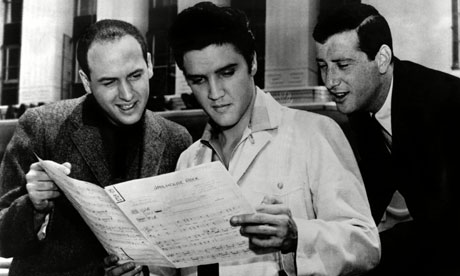No one sold black culture to white kids like Jerry Leiber, whose lyrics to such songs as Hound Dog, Love Potion No 9, Yakety Yak, Stand By Me, Spanish Harlem and Jailhouse Rock, mostly set to music by his friend, co-composer and business partner Mike Stoller, were a vital force in the transformation of popular music in the second half of the 20th century. When Leiber, who has died aged 78, wrote a line such as "I took my troubles down to Madam Ruth / You know, that gypsy with the gold-capped tooth"; "Who walks in the classroom, cool and slow? / Who calls the English teacher 'Daddy-O'?"; or (as interpreted by Elvis Presley) "They said you was high-classed, but that was just a lie / You ain't never caught a rabbit and you ain't no friend of mine", young ears were pinned back by the pungent informality of the language, the vividness of the exotic imagery and the earthy irreverence of the humour, such a long way from the strait-laced moon-and-June lyrics of Tin Pan Alley and all the product of Leiber's childhood immersion in the music and conversation of his African-American neighbours.
Only a few years after meeting as teenagers in Los Angeles in 1950, Leiber and Stoller were operating a production line of hit songs for such artists as Presley, the Coasters and the Drifters. In Stoller, an accomplished pianist, Leiber found a musical soulmate who loved the raw energy and direct emotional commitment of jazz, blues and boogie-woogie as much as he did.
The best of their songs were ingenious miniature soap-operas that conjured, in barely two and a half minutes on one side of a 45rpm single, whole worlds teeming with private eyes, bellydancers, junior hoodlums and put-upon schoolkids ("Take out the papers and the trash / Or you don't get no spendin' cash"). The best of them all may have been Shoppin' for Clothes, a minor hit in 1960 for the Coasters, in which they reworked a song by Kent Harris, originally called Clothes Line, to create the plaintive tale, in the form of a recitative set against Stoller's slow, sleazy, jazzy backing, of a penniless hipster lusting after a high-fashion suit, and listening to the patter of the department-store salesman: "'And for the playboy you have the latest in tweed, with the cut-away flap over twice / It's a box-back, two-button western model' / He said – 'Now ain't that nice…'" Inevitably, the hipster's credit is declined: "Pure, pure herringbone," he laments. "That's a suit you'll never own," he is told. The composers' marvellous instinct for voices ensured that they found, in the Coasters' Billy Guy and Carl Gardner, the ideal actors to perform their little drama, with Leiber coaching their delivery in minute detail.
There was poetry of all sorts to be found in Leiber's inventions. In the words of Spanish Harlem, co-written with Phil Spector, he winds the words around the tightening spiral of the melody in a carefully controlled acceleration, before releasing the tension with a romantic sigh: "There is a rose in Spanish Harlem / A red rose up in Spanish Harlem / It is a special one, it's never seen the sun / It only comes out when the moon is on the run / And all the stars are gleaming …"
Recognising early on that the music business of the 1950s was a battleground for shysters and conmen, Leiber and Stoller founded their own publishing company. After moving to New York in 1957, they set up offices first at 1650 Broadway and then at the nearby Brill Building and, starting with Spector, established a stable of proteges, including the gifted young writers and producers George "Shadow" Morton and the husband-and-wife team of Jeff Barry and Ellie Greenwich.
The new publishing moguls reaped an even greater reward from their hoard of copyrights when their songs were covered by the likes of the Beatles (Kansas City), the Rolling Stones (Down Home Girl), the Searchers (Love Potion No 9) and the Hollies (Searchin'). In 1995 their work was celebrated in a successful Broadway musical, Smokey Joe's Cafe, named after one of their earliest hits.
Leiber was born in Baltimore to Jewish parents whose origins were in Poland and Russia. The family lived in a Polish Catholic district, where Leiber encountered antisemitism; his mother's grocery shop was on the edge of the black quarter. "Of the two areas, I dug the ghetto more," he said. "That for me was where it was happening. I identified with the blacks. I felt very sympathetic to them, and they were sympathetic to me." He was five years old when his father died, and 12 when the family – including his two older sisters – moved to Los Angeles. As a 16-year-old pupil at Fairfax high school, he began scribbling down lyrics, and at 17 he was introduced by a schoolmate to Stoller, whose own family had moved from New York, where he had taken piano lessons with the great James P Johnson and hung out in the jazz bars of 52nd Street.
Despite the contrast between Leiber's unquenchable extroversion and Stoller's cool reserve, the two bonded immediately. Together they began to immerse themselves in the thriving R&B scene in the clubs on Central Avenue, and soon they were writing songs which demonstrated a perfect command of black vernacular. Jimmy Witherspoon, one of their heroes, was the first to perform a Leiber and Stoller song, with Real Ugly Woman in 1950. "She's 300 pounds of meat," Leiber had written, "and she's my female Frankenstein." Soon they were on record with Bobby Nunn and the Robins' That's What the Good Book Says, Charles Brown's Hard Times, Bull Moose Jackson's Nosey Joe and Little Willie Littlefield's Kansas City, also known as KC Lovin', their first big hit and subsequently to be covered by more than 500 artists.
Encouraged by the Hollywood record salesman Lester Sill (who later helped Spector found the Philles label), in 1952 Leiber and Stoller met the bandleader Johnny Otis and his singer Big Mama Thornton, whose tough, no-nonsense delivery inspired them to go home and write Hound Dog. "It just came leaping out," Leiber remembered. "Mike played and I yelled." While Otis played the drums as Thornton sang, the co-composers supervised the recording from the control booth, effectively making it the first of their many productions. When the record appeared, their discovery that Otis had added himself to the composer credits prompted them to take the step of forming their own publishing company.
A No 1 hit on the R&B charts in 1953, Thornton's record so impressed the young Presley that three years later he recorded his own version during a New York session. The co-composers detested Presley's treatment – "too white" – but they were impressed when it topped the pop charts and sold a million copies, and readily responded to requests to create more songs for the new king of rock'n'roll. Loving You, Treat Me Nice, King Creole, Bossa Nova Baby and Just Tell Her Jim Said Hello were among their songs recorded by Presley, plus those for the 1957 movie Jailhouse Rock. They were allowed to supervise some of the recordings, and found the singer to be a highly professional performer. "No direction was needed," Leiber said. "He always knew what to do."
In 1957 they made the move to New York, the centre of the music business, where they accepted A&R roles with the Atlantic label while laying the groundwork for their own company. They persuaded two of the Robins, for whom they had created Smokey Joe's Cafe, to go with them and form the Coasters. They then created a string of hits including Down in Mexico, Young Blood, Yakety Yak, Charlie Brown, Poison Ivy, Little Egypt and Along Came Jones. In 1959 they took over the studio supervision of the Drifters, who had enjoyed a hit in 1953 with one of their songs, Ruby Baby, and the first product of the new partnership, There Goes My Baby, established a new direction by setting gospel-trained voices to a Latin baion beat and a lush string arrangement.
Leiber and Stoller concentrated on producing the Drifters, bringing in songs from other sources, including the partnerships of Doc Pomus and Mort Shuman (Save the Last Dance for Me) and Burt Bacharach and Bob Hilliard (Please Stay), to turn the group into the pre-eminent R&B vocal outfit of the early 60s.
When Ben E King, the lead singer on the Drifters' biggest successes, left for a solo career in 1961, Leiber and Stoller produced three of his hits: Spanish Harlem, Stand By Me (on which King helped the writers to rearrange an old gospel hymn), and I (Who Have Nothing), originally an Italian song, for which Leiber created a new lyric.
In 1964, in partnership with George Goldner, an old-time New York music business hustler, they created a new label, Red Bird, on which to showcase material aimed at a younger audience. Leiber and Stoller had little to do with the records, but the Dixie Cups' Chapel of Love, co-written by Spector, and the Shangri-Las' Remember (Walking in the Sand) and Leader of the Pack, masterminded by Morton, made it a rewarding project.
Leiber's versatility allowed them to create a country hit, Jackson, for Johnny Cash and June Carter in 1967, in collaboration with the songwriter Billy Edd Wheeler, but the creative mainspring was winding down. That same year came Leiber and Stoller's last great song, Is That All There Is?, a masterpiece of ennui in the style of Brecht and Weill, inspired by a Thomas Mann short story. Written for the cabaret artist Georgia Brown, it was recorded two years later by Peggy Lee, painstakingly coached through no fewer than 36 takes by the song's lyricist until the singer's delivery had acquired the necessary degree of world-weariness.
The pair remained in partnership, producing records with artists of a younger generation, such as Stealers Wheel (Stuck in the Middle With You), Procol Harum (Procol's Ninth) and Elkie Brooks (Pearl's a Singer), and garlanded with industry awards. Smokey Joe's Cafe became the longest-running musical revue in Broadway history. Two years ago they published a joint autobiography, Hound Dog.
Married and divorced twice, Leiber is survived by his sons, Jed, Oliver and Jake.
• Jerome (Jerry) Leiber, lyricist, record producer and song publisher, born 25 April 1933; died 22 August 2011
• This article was amended on 24 August, to add that Shoppin' for Clothes reworked a song by Kent Harris; and to make clear that the Hound Dog lyrics quoted were from Elvis Presley's version. The original stated that all of the Robins moved to New York and that Bossa Nova Baby was written for Presley. This has been corrected.











